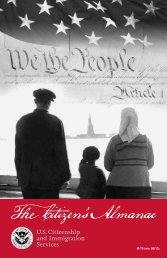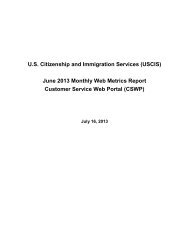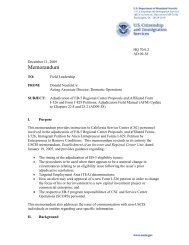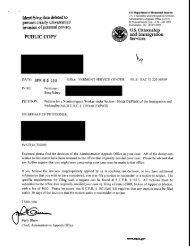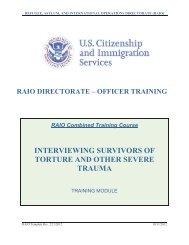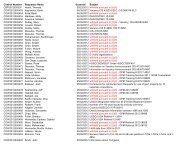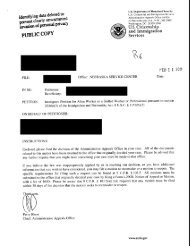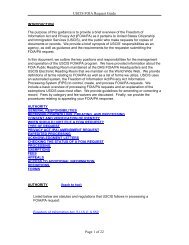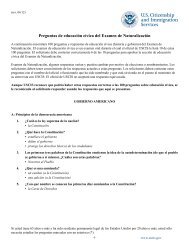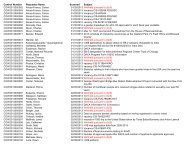~DtJitltk., - uscis
~DtJitltk., - uscis
~DtJitltk., - uscis
Create successful ePaper yourself
Turn your PDF publications into a flip-book with our unique Google optimized e-Paper software.
Page 34<br />
that she "has sustained national or international acclaim and that his or her achievements have<br />
been recognized in the field of expertise." See 8 C.P.R. § 204.5(h)(2), section 203(b)(1)(A)(i) of<br />
the Act, 8 U.S.C. § 1153(b)(1)(A)(i), and 8 C.P.R. § 204.5(h)(3).<br />
The regulation at 8 C.F.R. § 204.5(h)(3) provides that "[ a1 petition for an alien of extraordinary<br />
ability must be accompanied by evidence that tbe alien has sustained national or international<br />
acclaim and that his or her achievements have been recognized in the field of expertise." Thc<br />
weight given to evidence submitted to fulfill the criteria at 8 C.F.R. § 204.5(h)(3), therefore,<br />
depends on the extent to which such evidence demonstrates, reflects, or is consistent with<br />
sustained national or international acclaim at the very top of the alien's field of endeavor. A<br />
lower evidentiary standard would not be consistent with the regulatory definition of<br />
"extraordinary ability" as "a level of expertise indicating that the individual is one of that small<br />
percentage who have risen to the very top of the field of endeavor." 8 c.P.R. § 204.5(h)(2).<br />
While the AAO found that the beneficiary failed to meet the awards criterion pursuant to the<br />
regulation at 8 C.F.R. § 204.5(h)(3)(i), tbe AAO notes that the petitioner based the beneficiary's<br />
eligibility, in part, on awards or nominations that were received by organizations that employed<br />
the beneficiary. In fact, the petitioner submitted documentary evidence establishing that the<br />
beneficiary won two awards - tbe Latinbiz 2009 Women of Virtue Award and the Proctor<br />
Gamble Award. Neither award is indicative that the beneficiary "is one of that small percentage<br />
who have risen to the very top of the field of endeavor." See 8 C.F.R. § 204.5(h)(2). Regarding<br />
the Proctor Gamble Award, there is no indication that the beneficiary faced significant<br />
competition from throughout her field, rather than mostly limited to a few individuals in student<br />
status or other similarly limited competition. USC IS has long held tbat even athletes performing<br />
at the major league level do not automatically meet the "extraordinary ability" standard. Matter<br />
or Price, 20 I&N Dec. 953, 954 (Assoc. Comm'r. 1994); 56 Fed. Reg. at 60899. 7 Moreover,<br />
academic study is not a field of endeavor, but training for a future field of endeavor. As such,<br />
academic scholarships, student awards, and fellowships cannot be considered prizes or awards in<br />
the petitioner's field of endeavor. Competition for scholarships and fellowships is limited to<br />
7 While the AAO acknowledges that a district court's decision is not binding precedent, the AAO notes<br />
that in Matter a/Racine, 1995 WL 153319 at *4 (N.D. III. Feb. 16, 1995), the court stated:<br />
[T]he plain reading of the statute suggests that the appropriate field of comparison is not a<br />
comparison of Racine's ability with that of all the hockey players at all levels of play; but<br />
rather, Racine's ability as a professional hockey player within the NHL. This interpretation is<br />
consistent with at least one other court in this district, Grimson v. INS, No. 93 C 3354, (N.D.<br />
III. September 9, 1993), and the definition of the term 8 C.P.R. § 204.5(h)(2), and the<br />
discussion set forth in the preamble at 56 Fed. Reg. 60898-99.<br />
Although the present case arose within the jurisdiction of another federal judicial district and circuit, the<br />
court's reasoning indicates that USCIS' interpretation of the regulation at 8 C.F.R. § 204.5(h)(2) is<br />
reasonable.



